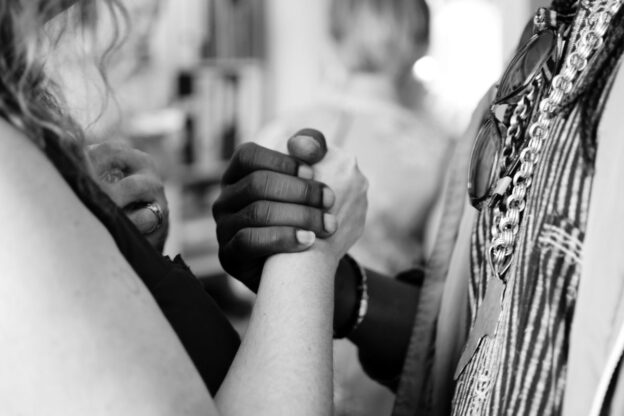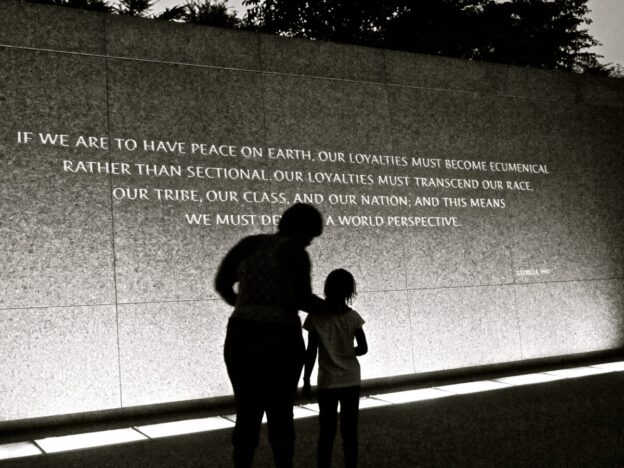What does it take to be a nimble follower of Jesus Christ?
Describing yourself as “nimble” (“quick,” “light,” “quick to comprehend”) may not be a trendy way to phrase a quality – I doubt I’ll see it on any t-shirts soon, unless it becomes a merchandised quote from a quirky show – but followers of Jesus Christ are called to be nimble, even if you can only picture “nimble” in the context of a candlestick and a bloke named Jack.
How can we be quick, light followers of Jesus who are quick to comprehend?
Nimble followers of Jesus first have situational awareness. Whether you’re an athlete (unlike the time I got whacked in the side of the face with a volleyball because I wasn’t paying attention) or an air force pilot, both of whom practice situational awareness regularly, you know the importance of keeping the big picture in mind. What is happening around you? Where are the people around you? At what part of a process are you now executing a maneuver? This global perspective is essential. It requires seeing beyond your own borders, looking beyond your own life, and tuning in to the activity around you.
Consider New Testament examples: Jesus spotting Zacchaeus in the tree; Jesus “having” to go through Samaria; even Jesus methodically braiding a whip to cleanse the temple. Jesus’ situational awareness went beyond these examples though: upon seeing a paralyzed man, he first forgives his sins. Upon responding to one plea for healing, he first feels power go out of him in a crowd. Though his disciples frequently got frustrated with his seeming lack of situational awareness – “everyone’s been looking for you,” “you’ve talked so long the people are hungry – what will we feed them?” and the favorite – “how can you be asleep? we’re all going to drown!” – Jesus had Spirit-filled situational awareness to the things were essential for him to carry out his earthly ministry.
Nimble followers of Jesus also have singlemindedness, that quality of focus that edges right up to preoccupation or obsession without going over – though, to others, it may seem we have. “Beloved, I do not consider that I have made it my own; but this one thing I do: forgetting what lies behind and straining forward to what lies ahead, I press on toward the goal for the prize of the heavenly call of God in Christ Jesus” (Philippians 3:13-14). To be singleminded means to have unity of purpose, thought, direction, focus, like the intent face of a crouched tennis player, putting pro golfer or springing basketball player. Singleminded people cut out otherwise harmless or good things in order to dwell on what they are doing and why they are doing it. The adolescent Jesus displayed this to Joseph and Mary’s chagrin when he got caught up in the temple and was surprised to see them worried.
Astronaut Chris Hadfield describes this quality at length in his fascinating book, “An Astronaut’s Guide to Life on Earth: What Going to Space Taught Me about Ingenuity, Determination, and Being Prepared for Anything.” Growing up in Canada, Hadfield decided he wanted to be an astronaut – even though at the time Canada didn’t have a space program. Every decision he made in his career positioned him to be well-placed in case the opportunity ever arose. It did. In the meantime, his singlemindedness had carried him through years before his goal was reached.
Nimble followers of Jesus are all in. They are willing to put skin in the game, to make sacrifices easily and quickly. From someone who played “all in,” consider the wise words of NBA star (and famous Hoosier) Larry Bird: “It makes me sick when I see a guy just stare at a loose ball and watch it go out of bounds.” Bird was describing the kind of player who was making a great deal of money but who wasn’t all in – and it made him sick.
Simon Peter wanted to be all in, thought he was all in, and it nearly destroyed him to realize that he wasn’t. Only by the power of the Holy Spirit was he able to be all in. And when he was all in, he no longer counted the cost. He followed the pattern Christ set in Gethsemene – “yet not my will, but thine be done.”
Quick, light, comprehending followers of Jesus maintain situational awareness, singlemindedness, and the wholehearted commitment of being all in.
So what keeps us from being nimble followers of Jesus Christ? What might prevent us from being quick and light as we follow Jesus? What might slow us down, burden us, wear us away, or cloud our comprehension?
When followers of Jesus don’t maintain situational awareness, it is often because we are zoomed in to our immediate circumstances or context to an extent that becomes nearsighted. I might have eyes for my own world, my own schedule, my own demands – and therefore, thinking about my grocery list, as it were, I back into a truck, only alerted to the presence of another vehicle when grinding metal crunches the air and halts my thoughts. A crumpled bumper is one thing, but what about when you lose situational awareness in your individual spiritual life or in the community life of your fellow believers? Nearsighted followers of Jesus run up against screeching metal and are startled out of their immediate focus. This has happened recently as North American Christians have reacquainted themselves with the ongoing reality of racism in the United States.
When followers of Jesus don’t maintain singlemindedness, we fall prey to distractions that take our eyes off the ball. Our attention wavers, or we get “choked by the cares of this world,” which we deem a higher priority than our singular bent towards Christ, or we slowly allow split loves, believing we can maintain more than one love, living with a divided heart. It is such an insidious way to die.
Because losing singlemindedness is the way of death, as Colonel Hadfield describes in his section on Pre-Launch in his chapter, “What’s the Next Thing That Could Kill Me?” Astronauts have to practice worst-case scenario simulations over and over again in multiple versions. What will we do if this fails? What will we do if this appears to fail but isn’t actually failing? And so on. And no astronaut can afford to maneuver the tricky re-entry phase of the mission while wondering if her or his family remembered to pay the water bill on time.
When followers of Jesus don’t maintain the commitment to be “all in,” we are usually giving in to a sneaky set of emotions: fear, or reserve, or self-preservation. Whatever we’re giving in to, it isn’t love – that effective excuse that silences others. “I love my kids too much to enter ministry,” and so on. Keeping something back usually means fear – fear of pain, fear of being made fun of (so many grown-up’s still carry that fear), fear of being let down, fear of missing opportunity for advancement – because sometimes self-preservation looks a lot like ambition. And we stand, and stare at the loose ball, and watch it go out of bounds…
If you want to be a quick. light follower of Jesus who comprehends quickly – in other words, nimble – think about a situation where you’re not feeling particularly nimble right now. Is there a situation about which you feel clouded, confused, divided, fearful, reserved, or nearsighted?
Now, put a little situational awareness into play: what are the facts? What are some primary dynamics? What outcomes might arise from the circumstances? (“What’s the next thing that could kill me?”)
Next, ask yourself: “Given my history, my personality, my current setting, what things tend to derail singlemindedness in my life? Given our history, our collective personality, our current setting, what things tend to derail singlemindedness in my tradition or denomination?”
And then, consider this: “What truths or misconceptions could keep me from being ‘all in’? What truths or misconceptions could keep my tradition or denomination from being ‘all in’?”
Can you be nimble for Christ? Can you, as an individual, be ready, quick, light on your feet? Is your tradition well-poised to be ready, quick, light on its feet, in service to Christ?
Dear ones, we are not playing the heartbreaking game that we narrowly lost that keeps us up at night; we’re not playing the game we had hoped to play, dreamed of playing when we envisioned a glorious tournament; we are playing this field, as it is, this moment. Today is the setting in which we are called to be nimble: behold, now is the favorable time; behold, now is the day of our salvation.
As Saul the persecutor-turned-Paul-the-Apostle wrote in II Corinthians 6:
Working together with him, then, we appeal to you not to receive the grace of God in vain.For he says,
“In a favorable time I listened to you,
and in a day of salvation I have helped you.”
Behold, now is the favorable time; behold, now is the day of salvation. We put no obstacle in anyone’s way, so that no fault may be found with our ministry, but as servants of God we commend ourselves in every way: by great endurance, in afflictions, hardships, calamities, beatings, imprisonments,riots, labors, sleepless nights, hunger; by purity, knowledge, patience, kindness, the Holy Spirit, genuine love; by truthful speech, and the power of God; with the weapons of righteousness for the right hand and for the left; through honor and dishonor, through slander and praise. We are treated as impostors, and yet are true; as unknown, and yet well known; as dying, and behold, we live; as punished, and yet not killed; as sorrowful, yet always rejoicing; as poor, yet making many rich; as having nothing, yet possessing everything.
We must be nimble so that we do not receive the grace of God in vain.
Aware to the situation in which we find ourselves – truthful and honest about what the console tells us as we blast off.
Singleminded in our pursuit of Jesus Christ and him alone.
All-in, dedicated, given over to that which we have given ourselves.
We must be nimble so that we do not receive the grace of God in vain.
Are we free to follow Christ quickly, lightly, quickly comprehending his ways? That is a question worth losing sleep over.
A brief note: equipping yourself to be a nimble follower of Jesus is a distinct trail leading off from the path along which we build monuments. Our experiences of Christ transcend the context in which we met him, learned about him and grew more like him. Anything other than quick, ready following of Jesus slides rapidly toward the slippery desire for tabernacles on a mountaintop, so beware.
And let us, as part of the Body of Christ, confess our sins.
Lord, as your followers we have often been nearsighted and self-absorbed, limiting our awareness of our situation; we have traded singlemindedness for trying to please many and gain the love of all; we have reserved part of ourselves from you, keeping back a portion and resisting your call to be “all in.” Because of this, we confess that we have confused our vision, weighed ourselves down, divided our heart, and trusted in ourselves to know best and protect ourselves fully. For this, we are truly sorry and we humbly repent. Forgive us and light in us the glow of your Holy Spirit. Help us to think of things other than ourselves; to be singleminded in love, thought, purpose and intent; and to release fear, self-preservation and ambition to you. Show us true liberty, plant in us a vision of what the church can be when we are equipped as a body to be nimble followers of you, light and quick to hear your calling. In the name of the Father and the Son and the Holy Spirit – Amen.
Earlier I stated:
“when followers of Jesus don’t maintain the commitment to be ‘all in,’ we are usually giving in to a sneaky set of emotions: fear, or reserve, or self-preservation. Whatever we’re giving in to, it isn’t love – that effective excuse that silences others. ‘I love my kids too much to enter ministry,’ and so on. Keeping something back usually means fear – fear of pain, fear of being made fun of (so many grown-up’s still carry that fear), fear of being let down, fear of missing opportunity for advancement – because sometimes self-preservation looks a lot like ambition. And we stand, and stare at the loose ball, and watch it go out of bounds…”
What if I shifted a few words and rephrased a few observations:
“Whatever we’re giving in to, it isn’t love – that effective excuse that silences others. ‘I love my family too much to risk my pension, no matter what doctrinal changes occur in my faith tradition. I love my friends too much to practice the faith I genuinely believe Jesus is calling me to. I love my denomination too much to wonder what God may actually be calling me to do,’ and so on. Keeping something back usually means fear – fear of pain, fear of being made fun of, fear of being let down, fear of missing opportunity for advancement…”
What might a fellowship of believers look like that was free to follow the swift promptings of the Holy Spirit?
Are we letting the ball go out of bounds? Are you?



